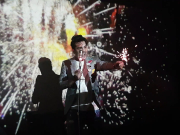KATHMANDU, April 28: The auditorium of the Nepal Army Headquarters reverberated with melodious notes in Sufi sounds, pop, classical, and fusion music. It was a rare occasion in the capital for getting to enjoy something really “wow” and big.

Shafqat Amanat Ali, a versatile singer from Pakistan, didn’t disappoint anyone that evening. Thanks to the Embassy of Pakistan in Nepal for bringing Ali to Kathmandu once again, many who wanted more from him last year when he was in town certainly got more than they expected last Friday.
Ali’s music was about power-packed voice, electrifying instrumental variations, and a rock-star performance that made many leave their seats and shake a few legs.
When Ali entered the venue in a fitting white cotton shirt and fading jeans, the audience expected him to sing his popular song “Mitwa” from the Bollywood cinema Kabhie Alvida Na Kehna.
It was obvious he saved his best for the last. However, all his songs are received warmly in South Asia; and so it was on the Friday night’s program in Kathmandu, too.
To keep the audience glued to their seats for some hours without making them feel restless is a difficult job. But this powerful Pakistani singer knew the tactics to not only make the audience admire his songs but also go along with him on his rhythm train throughout.
Each time when anyone from the audience tried to step out, he would cleverly notice it and immediately go “Abhi na jao chhodke, Ki dil abhi bhara nahi.”
It was good to see Ali taking care of the important factors of singer, his band, and their audience. His interaction with his audience in concert by making them sing along with him was electric. It’s likely this made many in the audience wait for him to track up for sing-along duets with him.

The night was not just about Ali, though. One lad in the crowd surprised by singing Ali’s “Mora saiyaan” gracefully. He joined him onstage and did the alaps and ragas. If music is said to be sans bars and limitations and nothing can stop one from singing, Ali’s night proved this when many in the hall tried their chance on the microphone and sang Ali’s songs.
Numbers like “Aaj janeki zid na karo” and “Yeh housala” were well received by the audience. In addition, an appearance on the stage by our own singer Swaroop Raj Acharya added more excitement to the evening. The soiree became more thrilling when Acharya and Ali together sang popular Nepali songs such as “Asare mahinama” and “Musu musu.”
As Ali had mentioned in an exclusive interview to myrepublica.com that he was trying to improve his diction in Nepali, it was more evident during the concert when he sang the aforementioned two Nepali numbers. Although it wasn’t easy for him to pronounce some Nepali words, his performance needs a special mention for the bravery he exhibited.
It was however disappointing to see Acharya forgetting the lines of “Asare mahinama” often. But he recouped his energy during the “Musu Musu” item. What was also surprising was Acharya’s tribute to Ali by singing a few lines of “Saiyan mohse bolena,” which was way above his verve in Nepali songs.
Which songs at the musical jamming made many come to floor and tap their feet?
They were “Deewani,” “Lal meri pat,” and “Mitwa.” Ali, who found ways to surprise with as much interaction with the crowd as he could, must’ve have been surprised himself when two Nepali girls followed him to the stage, took the microphone from him and started singing and dancing wildly.

In music, lyrics and voice are not always mandatory. Percussions and instruments can be as expressive and can thrill you. Ali’s band crew proved it, making it easy to understand when each of the backup members gave his best on lead guitar, bass, drum, flute, and dholak.
In summing up, this melodic singer of Sufi, pop, classical and fusion music, who didn’t disappoint his forefathers’ legacy and the prestigious Patiala Gharana, lived up to the expectation of the audience.
One disappointment, however, is that the event should’ve been targeted more at the general mass of the city and not just its protocol-formal diplomats and dowdy expatriates. The Pakistani Embassy, as host, said that the event was not for any commercial purpose. It was held to share Pakistani culture with Nepal and improve the bilateral relationship between the two countries. But the mutual relationship would be seen more at work if the event had been open to the general public, notorious for appreciating Pakistani music and its purveyors.
Source : MyRepublica.com
Another Review Of The Shafqat’s Performance In Nepal Can Be Found Here:
http://www.nepalnews.com.np/contents/2008/englishweekly/spotlight/may/may09/national6.php



































